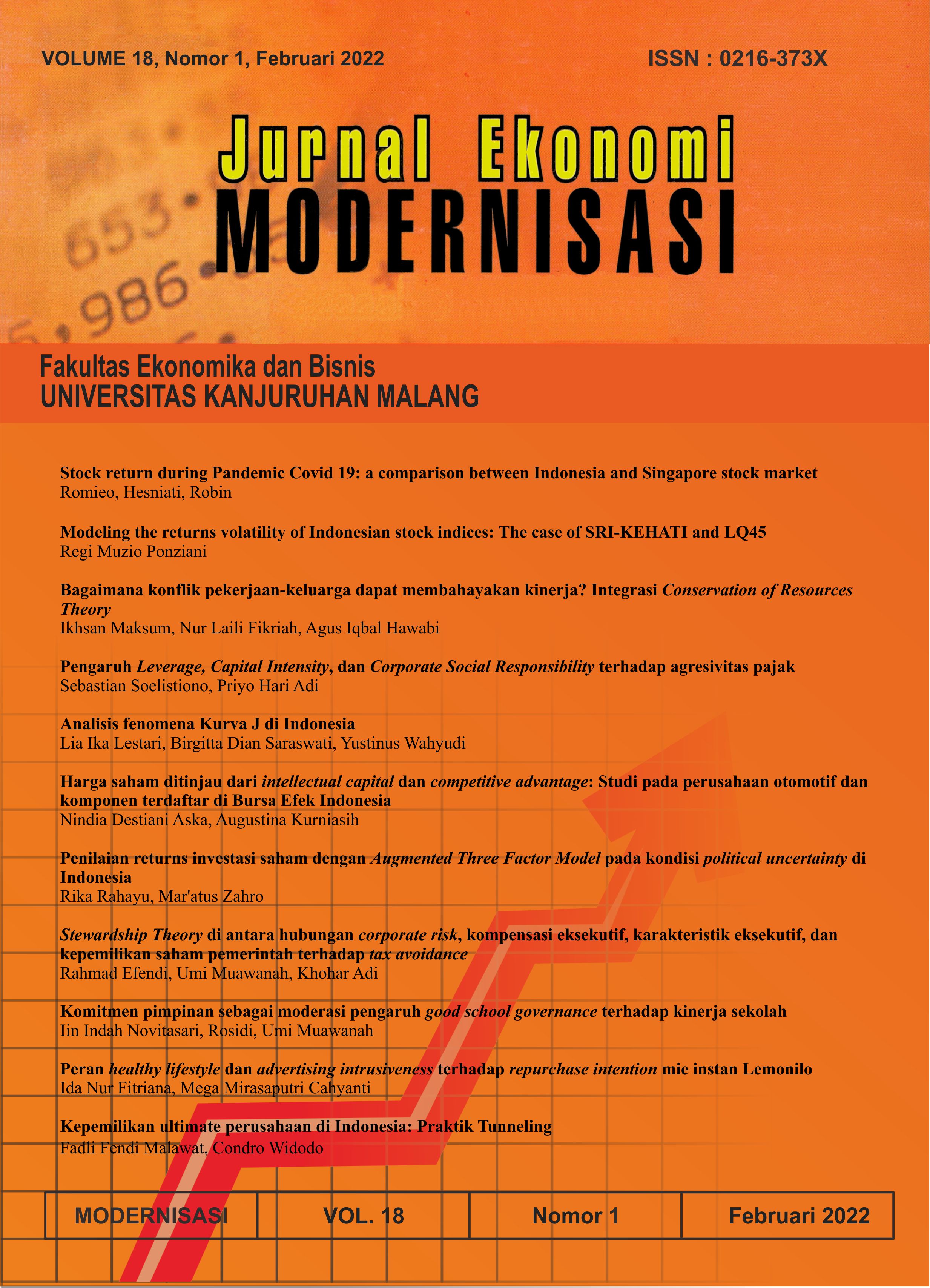Kepemilikan ultimate perusahaan di Indonesia: Praktik Tunneling
Main Article Content
Abstract
The purpose of this study is to analyze the effect of separation control rights and cash flow rights on tunneling activities. control rights indicator is interpreted through a socioemotional perspective. Furthermore, the main focus of the research is to investigate the divergence between control rights and cash flow right by ultimate structure ownership on tunneling activities through the size of related party transactions (RPTs) from the agency theory. The regression analysis technique was used to test the hypothesis developed in the study, the population is manufacturing companies on the Indonesia Stock Exchange (IDX), with a sampling technique using a purposive sampling method. The results of the study prove a significant influence between control rights on tunneling activities, showing that the motivation for control rights is not socioemotional. Meanwhile, cash flow rights have a significant influence on tunneling activities. Furthermore, the results of the study provide empirical evidence that higher divergence can lead to greater tunneling activities. The theoretical contribution of this research is to visualize agency theory and socioemotional perspective. It is hoped that further research can examine company ownership in Indonesia from a socioemotional perspective.
Downloads
Article Details
Authors who submit a manuscript understand that if the manuscript is accepted for publication, the copyright of the article shall be assigned to Jurnal Ekonomi Modernisasi (JEM).
References
Agnihotri, A., & Bhattacharya, S. (2019). Internationalization, related party transactions, and firm ownership structure: Empirical evidence from an emerging market. Research in International Business and Finance, 48, 340–352. https://doi.org/10.1016/J.RIBAF.2019.02.004
Alessandri, T. M., Mammen, J., & Eddleston, K. (2018). Managerial incentives, myopic loss aversion, and firm risk: A comparison of family and non-family firms. Journal of Business Research, 91, 19–27. https://doi.org/10.1016/J.JBUSRES.2018.05.030
Bona-Sánchez, C., Fernández-Senra, C. L., & Pérez-Alemán, J. (2017). Related-party transactions, dominant owners and firm value. BRQ Business Research Quarterly, 20(1), 4–17. https://doi.org/10.1016/J.BRQ.2016.07.002
Chang, S. J. (2003). Ownership structure, expropriation, and performance of group-affiliated companies in Korea. Academy of Management Journal, 46(2), 238–253. https://doi.org/10.2307/30040617
Chen, X., Hu, N., Wang, X., & Tang, X. (2014). Tax avoidance and firm value: evidence from China. Nankai Business Review International, 5(1), 25–42. https://doi.org/10.1108/NBRI-10-2013-0037
Cho, S., & Lim, K. M. (2018). Tunneling by Related-party Transactions: Evidence from Korean Conglomerates. Asian Economic Journal, 32(2), 147–164. https://doi.org/10.1111/ASEJ.12146
Claessens, S., Djankov, S., Fan, J. P. H., & Lang, L. H. P. (2002). Disentangling the incentive and entrenchment effects of large shareholdings. Journal of Finance, 57(6), 2741–2771. https://doi.org/10.1111/1540-6261.00511
Claessens, S., Djankov, S., & Lang, L. H. P. (2000). The separation of ownership and control in East Asian Corporations. Journal of Financial Economics, 58(1–2), 81–112. https://doi.org/10.1016/S0304-405X(00)00067-2
Diab, A. A., Aboud, A., & Hamdy, A. (2019). The impact of related party transactions on firm value: Evidence from a developing country. Journal of Financial Reporting and Accounting, 17(3), 571–588. https://doi.org/10.1108/JFRA-08-2018-0064/FULL/XML
Du, J., He, Q., & Yuen, S. W. (2013). Tunneling and the decision to go private: Evidence from Hong Kong. Pacific-Basin Finance Journal, 22(1), 50–68. https://doi.org/10.1016/J.PACFIN.2012.10.001
Du, X. (2014). Does Religion Mitigate Tunneling? Evidence from Chinese Buddhism. Journal of Business Ethics, 125(2), 299–327. https://doi.org/10.1007/S10551-013-1917-6
Fan, J. P. H., Jin, L., & Zheng, G. (2016). Revisiting the Bright and Dark Sides of Capital Flows in Business Groups. Journal of Business Ethics, 134(4), 509–528. https://doi.org/10.1007/S10551-014-2382-6
Habib, A., Jiang, H., & Zhou, D. (2015). Related Party Transactions and Audit Fees: Evidence from China. SSRN Electronic Journal. https://doi.org/10.2139/SSRN.2448088
Hamid, M. A., Ting, I. W. K., & Kweh, Q. L. (2016). The Relationship between Corporate Governance and Expropriation of Minority Shareholders’ Interests. Procedia Economics and Finance, 35, 99–106. https://doi.org/10.1016/S2212-5671(16)00014-9
Jara, M., López-Iturriaga, F. J., & Torres, J. P. (2019). Firm value and pyramidal structures: New evidence for family firms. Journal of Business Research, 127, 399–412. https://doi.org/10.1016/J.JBUSRES.2019.10.063
Jensen, M. C., & Meckling, W. H. (1976). Theory of the firm : Managerial behavior , agency costs and ownership structure. Journal of Financial Economics, 3(4), 305–360. https://doi.org/http://dx.doi.org/10.1016/0304-405X(76)90026-X
Johnson, S., La Porta, R. L., Lopez-de-Silanes, F., & Shleifer, A. (2000). Tunneling. American Economic Review, 90(2), 22–27. https://doi.org/10.1257/AER.90.2.22
Kang, M., Lee, H. Y., Lee, M. G., & Park, J. C. (2014). The association between related-party transactions and control–ownership wedge: Evidence from Korea. Pacific-Basin Finance Journal, 29, 272–296. https://doi.org/10.1016/J.PACFIN.2014.04.006
Kartika, V., Budiharto, & Mahmudah, S. (2017). Tanggung Jawab Direksi dalam Hal Terjadi Transaksi Afiliasi yang Mengandung Benturan Kepentingan pada Kasus PT. Sumalindo Lestari Jaya Tbk. Diponegoro Law Journal, 6(2), 1–20.
Kohlbeck, M., & Mayhew, B. W. (2017). Are Related Party Transactions Red Flags? Contemporary Accounting Research, 34(2), 900–928. https://doi.org/10.1111/1911-3846.12296
La Porta, R., Lopez-de-Silanes, F., & Shleifer, A. (1999). Corporate ownership around the world. Journal of Finance, 54(2), 471–517. https://doi.org/10.1111/0022-1082.00115
La Porta, R., Lopez-de-Silanes, F., Shleifer, A., & Vishny, R. (1999). Investor protection: Origins, consequences, reform. Journal of Financial Economics, 58(1–2), 3–27. https://doi.org/10.1016/s0304-405x(00)00065-9
Li, C., & Lin, D. (2021). Does overcapacity prompt controlling shareholders to play a propping role for listed companies? China Journal of Accounting Research, 14(1), 63–81. https://doi.org/10.1016/J.CJAR.2021.01.001
Lin, C. Y., Chen, Y. S., & Yen, J. F. (2014). On the determinant of bank loan contracts: The roles of borrowers’ ownership and board structures. The Quarterly Review of Economics and Finance, 54(4), 500–512. https://doi.org/10.1016/J.QREF.2014.04.005
Malawat, F. F. (2018). Pengaruh Pyramid of Structure dan Pegungkapan Transaksi Pihak Berelasi Terhadap Tindakan Ekspropriasi, Dimoderasi oleh Tata Kelola Perusahaan - Brawijaya Knowledge Garden. https://doi.org/http://repository.ub.ac.id/id/eprint/171124
Malawat, F. F., Sutrisno, S., & Subekti, I. (2018). Pyramid of Structure, Pengungkapan Transaksi Pihak Berelasi, dan Tata Kelola Perusahan : Indikasi Ekspropriasi. Jurnal Ekonomi Modernisasi, 14(1), 1–15. https://doi.org/10.21067/JEM.V14I1.2377
OECD. (2009). Guide on Fighting Abusive Related Party Transactions in Asia. OECD Publishing, 1–67.
Utama, C. A. (2015). Penentu Besaran Transaksi Pihak Berelasi: Tata Kelola, Tingkat Pengungkapan, Dan Struktur Kepemilikan. Jurnal Akuntansi Dan Keuangan Indonesia, 11(1), 37–54. https://doi.org/10.21002/jaki.2015.03
Wang, H. Da, Cho, C. C., & Lin, C. J. (2019). Related party transactions, business relatedness, and firm performance. Journal of Business Research, 101, 411–425. https://doi.org/10.1016/J.JBUSRES.2019.01.066
